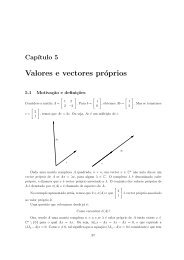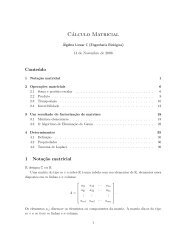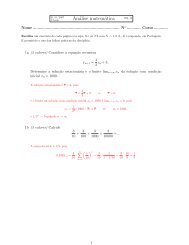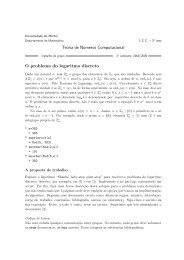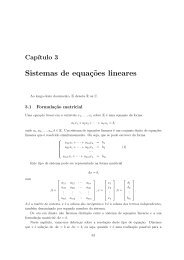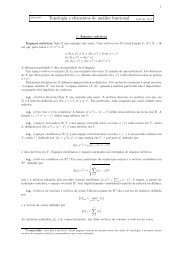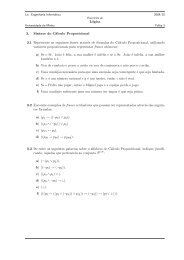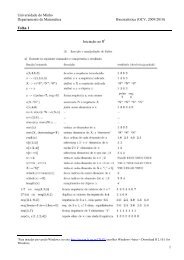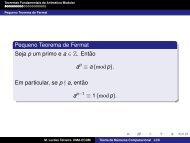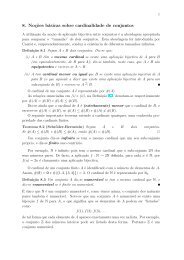My title - Departamento de Matemática da Universidade do Minho
My title - Departamento de Matemática da Universidade do Minho
My title - Departamento de Matemática da Universidade do Minho
Create successful ePaper yourself
Turn your PDF publications into a flip-book with our unique Google optimized e-Paper software.
6 FLOWS 46<br />
• Verifique que<br />
A =<br />
( ρ 1<br />
0 ρ<br />
• Verifique que<br />
( ) 0 ω<br />
A =<br />
−ω 0<br />
( ) ρ ω<br />
A =<br />
−ω ρ<br />
)<br />
⇒ e tA = e ρt ( 1 t<br />
0 1<br />
( )<br />
⇒ e tA cos(ωt) sin(ωt)<br />
=<br />
− sin(ωt) cos(ωt)<br />
( )<br />
⇒ e tA = e ρt cos(ωt) sin(ωt)<br />
− sin(ωt) cos(ωt)<br />
A origem é dita foco estável se ρ < 0, foco instável se ρ > 0.<br />
• Consi<strong>de</strong>re o sistema linear<br />
ẋ = x − y<br />
ẏ = x + y<br />
Determine a solução com condições iniciais x(0) = 1 e y(0) = 0.<br />
6.5 Existence and uniqueness theorems<br />
Here we consi<strong>de</strong>r a generic first or<strong>de</strong>r ODE of the form<br />
ẋ = v(x, t)<br />
where the velocity field v is a (continuous) function <strong>de</strong>fined in some exten<strong>de</strong>d phase space X × R.<br />
The phase space X may be some interval of the real line, an open subset of some Eucli<strong>de</strong>an R n ,<br />
or a differentiable manifold.<br />
The problem we address is the existence and uniqueness of solutions of the initial value (or<br />
Cauchy) problem. A local solution passing through the point (x 0 , t 0 ) ∈ X×R is a solution t ↦→ ϕ(t),<br />
<strong>de</strong>fined in some neighborhood I of t 0 , such that ϕ(t 0 ) = x 0 . Eventually, we’ll be interested also in<br />
the possibility of extending such local solutions to larger intervals of times.<br />
The basic existence theorem is 13<br />
Peano’s theorem. Let v(x, t) be a continuous velocity field in some <strong>do</strong>main A of the exten<strong>de</strong>d<br />
phase space R 2 . Then for any point (x 0 , t 0 ) ∈ A passes at least one integral curve of the differential<br />
equation ẋ = v(x, t).<br />
I<strong>de</strong>a of the proof. Natural guesses for the solutions are Euler lines starting through (x 0 , t 0 ). If<br />
we restrict to a sufficiently small neighborhood of (x 0 , t 0 ), we can assume that the velocity field is<br />
boun<strong>de</strong>d, say |v(x, t)| ≤ K, and that all such Euler lines lies in the “papillon” ma<strong>de</strong> of two triangles<br />
touching at (x 0 , t 0 ) with slopes ±K. Construct a family of Euler lines, graphs of ϕ n (t), such that<br />
the maximal step ε n of the n-th line goes to 0 as n → ∞. One easily sees that the family (ϕ n )<br />
is boun<strong>de</strong>d and equicontinuous. By the Ascoli-Arzelá theorem it admits a (uniformly) convergent<br />
subsequence. Finally, we claim that the sublimit ϕ ni → ϕ solves the differential equation. q.e.d.<br />
Both existence and uniqueness may fail.<br />
(ẋ) 2 − xt + 1 = 0<br />
)<br />
The Hamilton-Jacobi equation<br />
cannot have solutions satisfying the initial condition x(0) = 0, for otherwise we would have a<br />
negative “kinetic energy” (ẋ) 2 = −1 at that point!<br />
Some regularity of the functions involved in a differential equation is also nee<strong>de</strong>d to ensure the<br />
uniqueness of solutions. For example, both curves t ↦→ 0 and t ↦→ t 3 solve the equation<br />
ẋ = 3x 2/3<br />
with initial condition x(0) = 0. The problem here is that the velocity field v(t, x) = 3x 2/3 , although<br />
continuous, is not differentiable and not even Lipschitz at the origin.<br />
13 G. Peano, Sull’integrabilità <strong>de</strong>lle equazioni differenziali <strong>de</strong>l primo ordine, Atti Accad. Sci. Torino 21 (1886),<br />
677-685. G. Peano, Demonstration <strong>de</strong> l’intégrabilité <strong>de</strong>s équations différentielles ordinaires, Mathematische Annalen<br />
37 (1890) 182-228.





